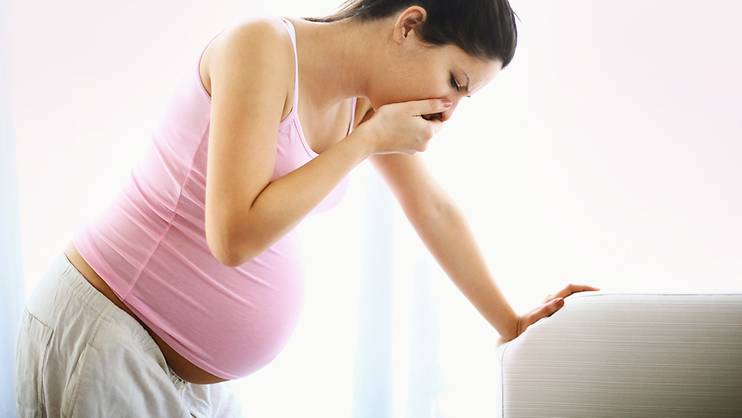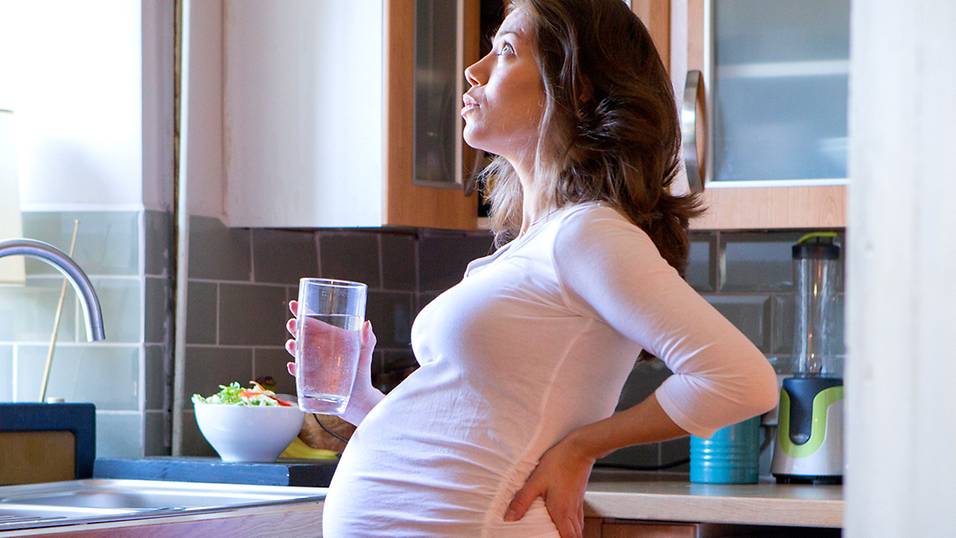Beat the bloat ― and other digestive problems you’re encountering in pregnancy ― with these timely tips.

Pregnancy is an exciting time. Your body goes through an amazing transformation as you grow a new person inside of you.
Unfortunately, since you both share the same space, bubba can impact your digestive system as he grows, causing discomfort. While it’s nothing to be alarmed about, you might look more green than glowing. Here’s expert advice from SmartParents’ gynae expert Dr Christopher Chong, a consultant obstetrician, gynaecologist and urogynaecologist at Gleneagles Hospital, on how to cope with these pregnancy-related peeves.
Morning sickness
Expect it to start… As early as four weeks, usually the first sign of pregnancy. Subsides by the second trimester.
It happens because… Of rapid hormone production, namely human chorionic gonadotropin (hCG) and oestrogen. It’s good for baby that the hormones keep multiplying, but bad for mummy as it makes her feel all queasy and nauseous. It could also be caused by your heightened sense of taste and smell. Certain aromas ― such as raw fish or certain perfumes ― can trigger a gag reflex. Dr Chong also points out that it could be that your growing foetus is sucking away at the sugar in your body, resulting in a drop in blood sugar, which leads to feelings of dizziness and nausea.
You know you have it when… You are on first-name basis with your toilet bowl and feel nauseous and miserable all day.
Cope with it by… Drinking a lot of fluids as all that vomiting can result in dehydration. If you are unable to keep anything down, including water, you might have hyperemesis gravidarum (prolonged vomiting). It might be harmful to baby, so seek medical help immediately. Your tummy will be extra sensitive so eat light, small meals throughout the day to keep your energy levels up. Keep snacks like crackers by your bed, plus stash some in your bag to combat the nausea on the go. Sip peppermint tea, ginger beer and include ginger in your dishes as it’s a great stomach-settling remedy.
If you are unable to keep anything down, including water, you might have hyperemesis gravidarum (prolonged vomiting).
Flatulence and belching
Expect it to start… As early as the first trimester thanks to hormonal changes.
It happens because… Certain types of food can trigger a build-up of gases in the large intestine. Also happens when you are unable to move your bowels regularly, thanks to constipation.
You know you have it… If your foul-smelling farts and burps has been clearing the room.
Cope with it by… Steering clear of gas-producing foods like beans, onions, cabbage, broccoli, Brussels sprouts and fried foods, plus carbonated drinks. Dr Chong advises that you take small meals frequently during the day rather than one big meal at a sitting, so that the food digests faster. “Medication such as carbon tablets and carminatives can also be given to reduce acid or ‘wind’,” he adds, “Probiotics aimed at the intestines are also useful.”
Haemorrhoids (Piles)
Expect it to start… In your second trimester, worse in the third.
It happens because… As the womb enlarges, it presses onto the blood vessels that run from the lower limbs to the upper body. “This causes the blood to flow to superficial veins and dilate them, leading to haemorrhoids and varicose veins in the lower limbs,” notes Dr Chong. “An increase in the progesterone hormone can also cause the blood-vessel wall to weaken, leading to easier dilation.” Plus, it can also happen when you’re constipated and strain while you try to move your bowels.
You know you have it… When you can physically feel varicose veins on your rectum. Also, if there’s pain or excessive itching at the rectum opening and you see blood on the tissue when you wipe after a bowel movement.
Cope with it by… Managing your constipation and not straining. You can also apply a topical cream, an ice pack or take oral meds to reduce the swelling and try to shrink the haemorrhoids. It’s important to treat the condition as soon as possible, stresses Dr Chong, as it can be exacerbated during delivery and lead to an obstruction or turn gangrenous. Although rare, only surgery can fix it then. Avoid prolonged standing or sitting as it will increase pressure and pain. Instead, raise your legs often and try light exercises. Dr Chong recommends doing Kegels as it can help to improve the muscle tone around the anus, thus reducing your haemorrhoids risk or its severity.

Expect it to start… As early as the first trimester, thanks to hormonal changes.
It happens because… The increase in the progesterone hormone causes the intestinal muscles to relax, which slows down the peristalsis muscle moving food through your digestive tract. Constipation is the outcome. “It can get worse as pregnancy progresses as the growing womb presses onto the intestines and in some people, creates an obstruction to peristalsis, but this is usually mild,” adds Dr Chong.
You know you have it when… You find yourself straining when you try to move your bowels or feel very bloated and “backed up”.
Cope with it by… Drinking more fluids (prune juice helps) and taking high-fibre foods such as whole-grain cereal, bread, brown rice and beans. Gas-producing foods such as broccoli and cabbage can also stimulate peristalsis. The same goes for yoghurt and other probiotic foods that contain live bacterial cultures to facilitate digestion. Reduce consumption of low-fibre foods that slow down digestion, such as meat and dairy. “Exercises such as swimming and walking can help improve blood circulation and bowel movements. If needed, medication can be given to soften stools and help you purge,” Dr Chong adds. You might also want to speak to your gynae who can reassess the prenatal supplements you’re taking, he advises. Some contain a certain type of iron or calcium that might trigger constipation.
As tempting as it might be ― especially during your last trimester ― don’t lie down right after a meal as it will cause the stomach acids to rise back up again.
Heartburn
Expect it to start… From the first trimester, worsening as the pregnancy progresses.
It happens because… Bubba’s rapid growth exerts pressure on your stomach and uterus, crowds your abdominal cavity and pushes the stomach acids back up into the oesophagus. The production of progesterone also relaxes the valve that separates the oesophagus from the stomach, allowing gastric acid to seep back up.
You know you have it… When you experience the burning sensation from the bottom of your breastbone to the lower-throat area. This is usually accompanied by a sour taste.
Cope with it by… Taking smaller meals and keeping active. “You should also not eat before bedtime,” Dr Chong warns. In fact, as tempting as it might be ― especially during your last trimester ― don’t lie down right after a meal as it will cause the stomach acids to rise back up again. Another tip: When you sleep, use more pillows to prop yourself up ― being elevated keeps the acids down.
SmartParents expert Dr Christopher Chong is an obstetrician gynaecologist at Gleneagles Hospital.
Like us on Facebook and check SmartParents regularly for the latest reads!
You may also like these…
7 must-do things before you go into labour